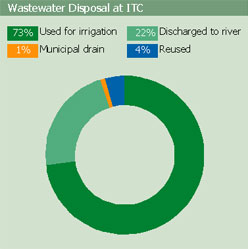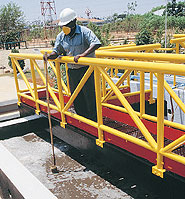 Waste
Water Discharge Waste
Water Discharge
ITC endeavours to achieve zero effluent discharge in all its
Units. Reflecting the efforts and progress in this direction, a number of ITC Units –
the Cigarette Factories at Bengaluru and Saharanpur, the ITC Group Research &
Development Centre at Bengaluru, the Leaf Plant at Anaparti, the Packaging & Printing
factory at Tiruvottiyur, and the Cast Coating Plant at Bollarum, near Hyderabad, already
utilise the entire quantity of their treated effluents for operating their cooling towers,
flushing toilets, gardening and other appropriate activities.
| Treated
Wastewater Disposal in Paper Business |
|
2002–03 |
2003–04 |
| River |
26% |
23% |
| Irrigation |
74% |
77% |
ITC’s Paperboard and
Specialty Paper Units have made significant progress in the endeavour to ensure that the
entire volume of their treated effluents is used for agriculture. This is in line with the
recommendation of the Ministry of Environment & Forests, Government of India, and the
Central Pollution Control Board (CPCB), in the voluntary charter that they have proposed
for the 17 most polluting industries, including the paper industry. These Units already
implement stringent water conservation measures. But as the manufacture of paper and
paperboards is intrinsically water-intensive, these Units still discharge some treated
water.
The voluntary charter proposed by MoEF and
CPCB recommends that paper units move to 100% discharge of treated effluents for farming
and agriculture.
 Chemical, oil and
fuel spills Chemical, oil and
fuel spills
ITC’s EHS guidelines require all the Units of the Company to plan the storage and
handling of chemicals, oils and fuels in properly designed and tested storage vessels. The
Company has effective spill control arrangements and infrastructure like bunds and
retaining walls in its Units. These are routinely checked to ensure that they are in good
condition. No spills of chemicals, oils, or fuels were noted in 2003–04 by any ITC
unit.
Incidents of
fines for non-compliance
ITC maintains a ‘beyond compliance’ status in EHS performance in its Units. Any
non-compliance is dealt with immediately. The Units promptly respond to any inadvertent
violation pointed by stakeholders or corporate EHS auditors. As a result, there were no
fines for non-compliance imposed during 03–04.
Total
environmental expenditure
ITC remains committed to a very high level of EHS performance. This is backed by suitable
investments and financial commitment. During 2003–04 ITC Units incurred a capital
expenditure of Rs. 2.6 million and a revenue expenditure of Rs. 11.65 million on EHS
projects. |
 Waste
Water Discharge
Waste
Water Discharge Chemical, oil and
fuel spills
Chemical, oil and
fuel spills